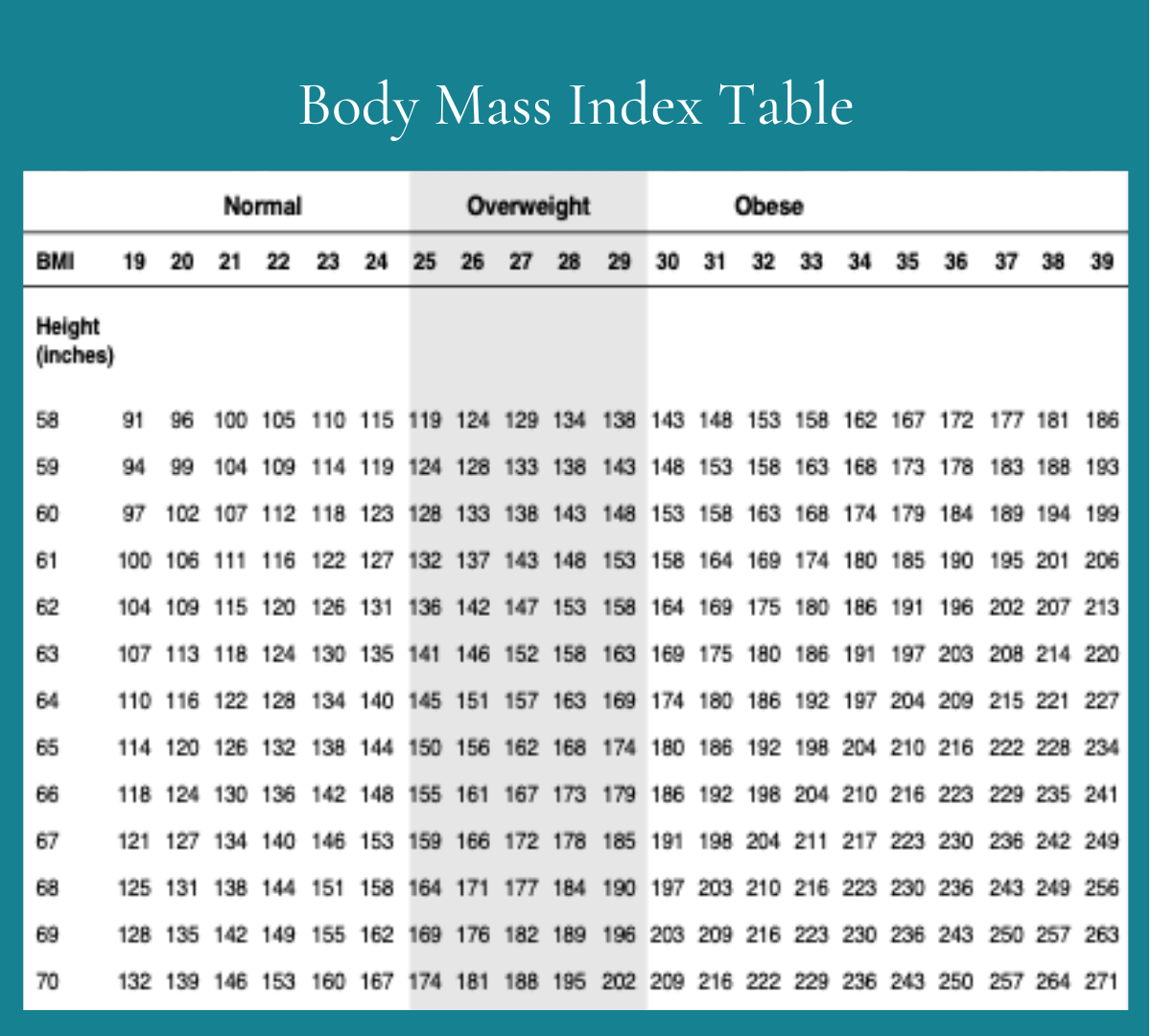Are you wondering what your Body Mass Index (BMI) is?
With my BMI Calculator, you can find out exactly where you land.
Body Mass Index Calculator
*Enter your email to see your calculation.
BMI Calculator
Your BMI:
0
What Every Woman Needs to Know About Body Mass Index
When you’re trying to shed a few pounds chances are you’ve heard the term BMI thrown around a lot. BMI or body mass index can help indicate how your body weight relates to a scale that measures healthy weight. As you keep an eye on your weight, knowing your BMI may also help you fit into those jeans you threw in the back of your closet!
BMI at a glance
When you’re talking about your BMI, you’re talking about your weight in kilograms divided by the square of height in meters. The result corresponds to a chart that lets you know if you are underweight, overweight, a healthy weight, or obese.
BMI does not measure body fat directly. It is an estimate of how moderate a person’s body weight is based on their height and weight. Knowing your BMI can let you know if your weight for your height is considered healthy or not. It can also indicate if you may be at greater risk of getting certain diseases.
It’s extremely important to know that while BMI correlates with body fat level, it does not distinguish between the weight that comes from fat, muscle, and bone. So you can be extremely muscular and have the same BMI as someone who is overweight. Keep this in mind if you know you have little body fat but end up measuring high on the BMI scale.
Some people consider a person’s BMI controversial since it was developed 180 years ago. Since then, the average height and weight for females have increased. When you factor in these tidbits, it can help keep everything in perspective when you’re talking about your BMI and prevent you from becoming obsessed with it.
How is BMI calculated?
Unless you want to spend your time doing some long division and multiplication, it’s much easier to use an online BMI calculator (like the one I have above) to figure out what your magic number is.
BMI chart
Then you can compare it to the BMI chart to see where you fall. Click here to view the full chart for BMI over 39.
Here’s the breakdown:
If your BMI is less than 18.5, it falls within the underweight range.
If your BMI is 18.5 to 24.9, it falls within the normal or healthy weight range.
If your BMI is 25.0 to 29.9, it falls within the overweight range.
If your BMI is 30.0 or higher, it falls within the obese range.
This doesn’t mean that if your BMI is 16 you can run out and binge on your favorite foods or if your BMI is 28 you need to go on a lettuce diet. It just gives you one snapshot of your weight.
Your doctor can help you further interpret the results and what you should do with them in regards to diet and exercise.
Why is it important to know your BMI?
Women like to know their BMI if they’re trying to lose weight to see if they are overweight or not. But, as we said earlier, a high BMI doesn’t always mean you’re overweight. You may have a lot of muscle that is tipping the scale and raising your BMI.
For women who are overweight, knowing your BMI can motivate them to try and maintain a moderate weight. Doing this can lower the risk of developing medical conditions such as:
Cardiovascular disease
Type 2 diabetes
Stroke
Osteoarthritis
When it comes to your BMI and other factors relating to your health and weight, it’s always important to know where you stand. While BMI certainly does not paint the entire picture of your health, it can give you a glimpse into how you should handle your diet and exercise regimen.
Ways to control your BMI
If you’re overweight and feeling unhealthy, you can keep your BMI in check by:
Eating more fruits and vegetables
Avoiding high sugar and processed foods
Choosing whole-grain products
Drinking more water
Exercising more to burn more calories
Avoiding late-night snacking
You may also want to spend more time in bed. Not getting enough sleep can lead to weight gain and move you up on the BMI chart. Plus, it will make you less grouchy, so it’s a win-win all around.
The bottom line
When it comes to BMI, women should be aware of where they fall on the chart, but should also remember that it is not a complete picture of health. Since BMI doesn’t distinguish between fat and muscle, people with completely different lifestyles can have the same BMIs which can be misleading.
When you know your BMI and you are on the unhealthy side, you can turn it around by eating better and exercising more. Doing this can help prevent cardiovascular disease and other serious health problems. Remember, your BMI doesn’t define you but can help you live a healthier lifestyle.


